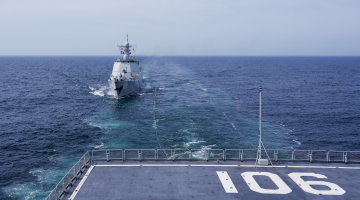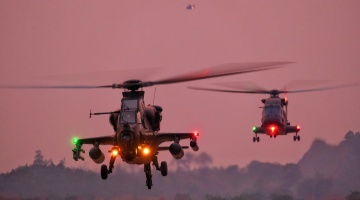By Xu Haiyun
Nearly a year after Finland and Sweden jointly applied to join NATO, Finland has become NATO's newest member not long ago, while Sweden remains uncertain. As NATO Secretary-General Jens Stoltenberg said, Finland is the country that joined NATO in the shortest time in history. But at the same time, Sweden is very likely to become the most difficult in history to join NATO. This kind of contradiction has not only become a prominent feature of NATO's northward expansion but also indicates that its northward expansion will inevitably bring serious consequences.
Abandoning neutrality stems from multiple considerations
After the end of the Cold War, the US and NATO began to actively promote extreme unilateral hegemonic policies and ideological diplomacy. They sought to establish a "de-Russification" new European order and were obsessed with maintaining the international order based on Western hegemony rules. NATO's northward expansion is a concrete manifestation of the above-mentioned ideas. The accession to the treaty seems to be the wish of Finland and Sweden, but the root cause lies in NATO's long-term policy of "de-Russification" in European security construction. In fact, the Russia-Ukraine conflict is also a chain reaction triggered by this policy.
On the one hand, the reason why Finland and Sweden chose to join NATO is to maximize their own security interests and seek NATO's protection in the Russia-Ukraine conflict. However, the reality is not that simple. Russia has repeatedly stressed that special military operations against Ukraine are limited and will not affect Northern Europe after the Russia-Ukraine conflict. Therefore, rather than saying that Finland and Sweden insist on joining NATO to avoid risks, it is better to say that the two countries are trying to satisfy NATO's so-called political correctness proposition and create an atmosphere of "together against Russia" among European countries. On the other hand, NATO's push for Finland and Sweden to join the treaty is not only to expand the political momentum of the anti-Russia camp in the West but also to gain a greater strength advantage in the Russia-Ukraine conflict. However, this practice of continuously expanding the conflict front is tantamount to taking risks and will only complicate the security situation in Europe.
Each has its own demands and faces real difficulties
At present, the US and NATO seem to have the strategic advantage of leading the conflict between Russia and Ukraine, but in fact, they do not. Affected by the spillover effects of the Russia-Ukraine conflict, the US and NATO are paying a heavy price for the so-called political correctness. For example, many NATO member states have experienced stagnant economic development, constant public protests, and intensified political confrontation. In the view of some NATO member states, the joining of Finland and Sweden will not help alleviate the multiple realities that NATO is currently facing and will only intensify Russia's military countermeasures. This is why some NATO member states are not interested in accepting Finland and Sweden. Many European countries and their people are worried about NATO's continuous expansion of the anti-Russia camp, especially NATO's blind pursuit of eastward expansion or even northward expansion, will trigger Russia's increasingly drastic countermeasures.
Joining NATO also means that Finland and Sweden will further deepen their strategic dependence on the US and NATO, which runs counter to the European strategic autonomy advocated by "old European" countries such as France. In addition, Finland and Sweden chose to join NATO at the sensitive moment of the Russia-Ukraine conflict, which will inevitably lead to hostility with Russia. The long-standing neutral status of the two countries in history has been changed. The two also became the strategic frontier of NATO's confrontation against Russia and they will face enormous political and military pressure.
Intensifying the confrontation affects the security trend
The joining of Finland and Sweden will directly lead to major changes in the Nordic security environment. After Sweden joins NATO, all the Nordic countries will become NATO member states, and Russia will have to face NATO's encirclement from Northern Europe, Central Europe, and Southern Europe, and its strategic security environment will become more precarious. In this case, Russia's countermeasures will also become tougher. By then, the security situation in Northern Europe, the Baltic Sea, and the North Sea will become increasingly tense, and the strategic competition between Russia and NATO around the Arctic and its adjacent navigation channels will also intensify.
Finland and Sweden's accession to NATO will worsen the political and security atmosphere in Europe and will also intensify the confrontation between NATO and Russia, which will lead to faults in the European security architecture. First, the grey area of European geopolitics is decreasing. Europe will not only show the trend of forming camps but will also increase competition and confrontation marked by ideology. The strategic confrontation between NATO and Russia will be in full swing, and the geopolitical competition in Europe will continue to intensify. Second, the European security ecosystem will split and lead to fragmentation. There will be more and more conflicts and disputes between the US and Europe, different parts of Europe, and NATO member states. Even within the various European nation-states, the number of disputes and the level of intensity will continue to increase among different interest groups, social classes, political parties, and government agencies.
It is foreseeable that with NATO's northward expansion as the trigger, the contradictions, competitions and confrontations within Europe will exist for a long time, and may continue to intensify, which will lead to a more complicated and severe situation.
(The author is a professor at the Department of History, Renmin University of China)









